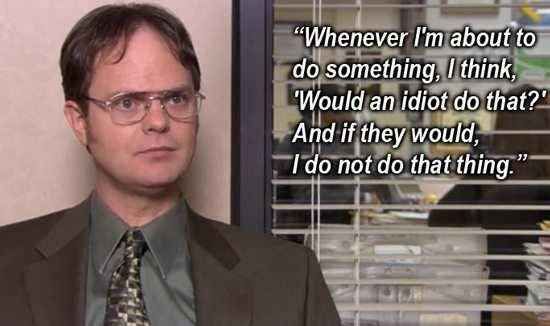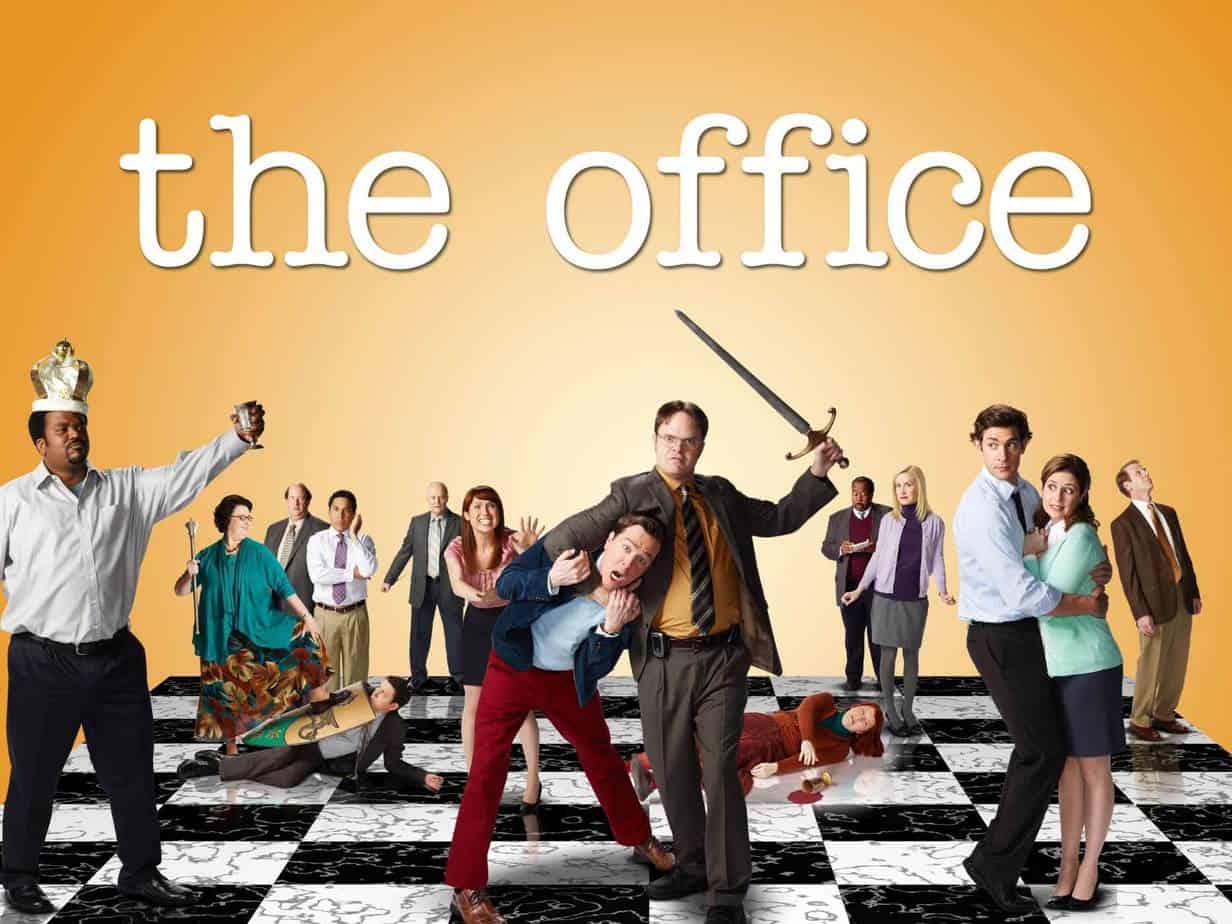MICHAEL SCOTT
when employers say they’re like a family they mean it*
*you’re all largely interconnected because of obligation, you have to dissociate to get along, they owe you money because you bailed them out, you know way more about each other than u ever want to, u hate them
@bunny6gamer
Psychotherapist here… Michael Scott is a textbook case of histrionic personality disorder.
Psychologists Diagnose Favourite Fictional Character From TV and Movies
DWIGHT SCHRUTE
Dwight is my favourite character to watch. Without Dwight, The Office would not be the same, which is how we know he’s going to come back even after his firing and brief stint at competitor Office Works.
The writers have made much use of the comedy trick in which a character behaves robotically. An element of fussbudget is necessary in these characterisations. Dwight is so robotic in his responses that Jim never fails, not once, to successfully wind him up (until Pam blows Jim’s cover one day by laughing — a welcome subversion). Whatever outlandish story Jim concocts is swallowed hook, line and sinker by Dwight, whose backstory of a closed religious cult means he remains susceptible to supernatural and otherwise highly unlikely scenarios, partly because his own life has been full of highly unlikely scenarios, and partly because he grew up sheltered from popular culture and primed to be unquestioning.
This quality is also what makes Dwight the perfect office employee. His respect for authority means he is perfectly loyal to his boss. (Subverted with irony when Dwight reveals “I’m going wherever they value loyalty… the most.”)
It is revealed that in earlier seasons Dwight is the star salesperson of Dunder Mifflin and when we learn this, it makes perfect sense. Dwight’s dog-with-a-bone mentality is probably what keeps Michael Scott’s branch afloat.
Dwight is prone to obsessive behaviours in general and is highly attracted to deciphering the mechanics of something, probably because he is so mechanical himself. He is basically a human robot. When invited to a house party he spends the entire evening testing the architectural structures of the house. When Jan turns up to the office with her newborn baby Dwight takes her expensive pram and puts it through all sorts of destructive tests. He constantly expects disaster and, let’s face it, very often he is rewarded. He stores weaponry all around the office, just in case his martial arts/gun/hunting skills are needed.
Dwight is an especially well-written character because his strengths and his shortcomings are so well balanced they big-picture cancel each other out. Sure, he sets the office on fire (and almost gets himself fired) during a training exercise, but on another occasion he saves the day with the weapons in his desk.
HUMOUR ASSOCIATED WITH DWIGHT
Character humour: We recognise the character who respects hierarchies to the point of sycophancy but who condescends to perceived inferiors. Mr Colins of Pride & Prejudice is another example of this archetype. These characters are funny because they are recognisable but also because they can’t see the bigger picture. Their own adherence to hierarchy means they’ll forever be ‘second in charge’, with no real power at all.
Slapstick: Actor Rainn Wilson has a gift for physical comedy. He puts his character into humiliating situations, always with a perfect straight face. He is on a parr with Steve Carell in this regard, though more emotional variation is required for Carrell”s Michael Scott character.
Hyperbole: In one episode Jim says, “My friends don’t believe Dwight is real.” Of all the characters on The Office, Dwight is one of the most unlikely. He is an exaggeration in all kinds of ways but overall, he is exaggeratedly pragmatic. This trait is milked to the max when he puts Angela’s sick cat in the freezer and kills it, thinking he’s done his girlfriend a favour.

More problematically for the year 2020 is the abundance of gay jokes. One running gag is that two heterosexual men (Dwight and Michael), who consider themselves manly-men and are constantly going out of their way to prove their manliness, regularly and naively put themselves in situations which make them appear like a gay couple to outsiders.
Part of the joke is, of course, nothing to do with actual gay men. These two characters are blind to others’ perception and fail to see that they are coded as gay. Because of their own homophobia (shared by much of the audience, let’s face it), this is the last thing either character would want for themselves. Michael in particular is overtly homophobic. We regularly witness his derision directed towards gay character Oscar Martinez.
Mistaken identity can be funny, but doesn’t tend to work as a gag on its own. Someone mistaking Michael Scott for a car salesman wouldn’t be funny on its own, right? There would have to be a narrative build-up which makes it funny, e.g. Michael has said he knows a lot about cars when he really doesn’t, etc. Mistaken gay identity, however, tends to work on its own, and I’d encourage everyone to ask… why? Why is that?
Because behind every gay joke is an assumed (ie. taken-for-granted) demotion of power and privilege. A very similar dynamic is at play when men are mistaken for women. In fact, it’s exactly the same gag, because misogyny and homophobia are two sides of the exact same coin. I’ve previously written about this at length.
American sit-com Friends was on air at around the same time and has since been criticised since for its LGBTQ jokes:
…the deeper problem with Friends: its “realistic” portrayal of cultural attitudes towards queerness ended up reinforcing those same attitudes, not driving society forward. Although female characters like Phoebe are allowed to explore their sexualities, ostensibly-cis men like Joey, Ross, and especially Chandler are not given the same chance with their gender.
Friends is transphobic
Does The Office get a pass because Oscar Martinez is one of the few sensible people in the show? I’m not sure that’s how it works. Instead, what we may be dealing with is the Female Maturity Formula but this time applied to a gay man. Does Oscar get his own character arc? The very concept of ‘character arc’ in a sit-com is problematic because none of the comedic characters change much. The other salient question in this case: Does Oscar get his fair share of non-gay plot lines? Again this is muddied because every single one of the ‘straight’ (ie. non-hyperbolic, relatable) characters is the target for one attribute in particular. (Phyllis/Fatness, Creed/underhandedness, Angela/cultish cat-worship etc.)
The same criticism might be levelled at The Simpsons for the Mr Burns/Waylon Smithers dynamic, except the homosexuality of Smithers was left ‘off-the-page’ until September 2015, when Waylon’s gayness featured in “The Burns Cage“. Until then, the showrunners enjoyed the luxury of plausible deniability:
The idea for Smithers’ ambiguous sexual orientation came from Sam Simon. He proposed that Smithers should be gay and have an undying love for Mr. Burns, but little attention should be drawn to it.
Wikipedia
Meanwhile, male assistants who appear too loyal to their male bosses must still walk a homophobic tightrope in general.


